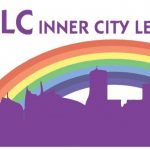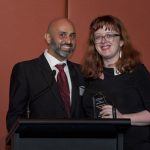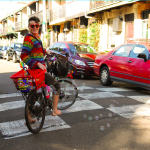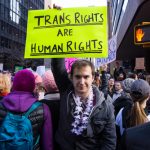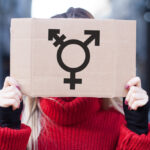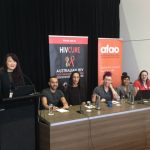Sex and Gender Diverse Suicide Prevention: An Interview With SAGE’s Dr Tracie O’Keefe
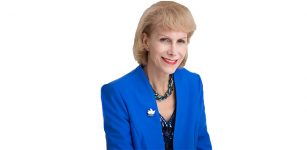
Tracie was a teenage intersex and trans woman growing up in 1960s northern England. It was a world she found hostile. Her family rejected her. The health professionals who were supposed to be helping were negligent. And things got so bleak that she attempted suicide several times.
The thing is though, the life that Tracie found ahead has been incredibly rewarding. Fifty years on, she’s happily married to her wife, she’s surrounded by valuable friends, and she’s fought for nearly five decades for the rights of sex and/or gender diverse people and brought about significant change that’s upheld them.
“So, choosing life over suicide has been a good choice for me,” Dr Tracie O’Keefe explains in her account of her earlier dark days and life-affirming future. Her story is part of the Sex and/or Gender Diverse (SGD) Life Over Suicide Project.
Recently launched by Sex and Gender Education (SAGE), the Life Over Suicide Project shares the stories of people from sex and/or gender diverse groups who considered suicide, but decided not to, so that individuals who may be struggling have some insight into why others have chosen to stay alive.
SGD activism
SAGE Australia is a group, which campaigns for the rights and dignity for people from sex and/or gender diverse groups. The suicide prevention project is just the latest in a long list of initiatives and campaigns that it has been a part of since its inception in 2001.
SAGE co-founders Dr O’Keefe and Norrie have been at the forefront of sex and gender diverse activism for decades. The two played a part in the first Australasian Conference on Sex and/or Gender Diverse Human Rights and they were instrumental in the marriage equality campaign.
The co-founders were major contributors in the consultation process that saw amendments to the Sex Discrimination Act, so that it protects sex and/or gender diverse groups of people. And in 2014, Norrie won a four year legal battle at the High Court of Australia to have their sex registered as non-specific.
Remaining vigilant
When she’s not campaigning as part of SAGE, Dr Tracie O’Keefe works as a clinical hypnotherapist, psychotherapist, sex therapist and naturopath. And she makes clear that over the past five decades, she seen a lot of changes in terms of SGD rights.
And one thing Dr O’Keefe stresses is that the only way to bring about these changes is to stand up and speak out. And as part of a minority group, once legal rights have been upheld, it’s important to remain active and protect them, “as one cannot assume they will last”.
Sydney Criminal Lawyers® spoke to Dr O’Keefe about the importance of people from sex and/or gender diverse groups sharing their stories as part of the project, her research into suicide in the SDG community and her thoughts on the current policies of the Coalition government.
Firstly, SAGE has just launched the Sex and/or Gender Diverse Life Over Suicide Project. Dr O’Keefe, how prevalent would you say suicide or the contemplation of it is in sex and/or gender diverse communities?
The sex and gender diverse community is very wide. It takes in intersex people, trans people and cross dressers etc. You can find the whole variation on our website.
And it can vary from area to area, in that many intersex people don’t actually know they’re intersex.
They may have Klinefelter: an extra X on their chromosomes. They may have androgen insensitivity syndrome, have XY genes but were born with a vagina. And they often don’t know until they don’t menstruate when they’re 18 or 19 years old.
So, for that group of people it can be quite a shock. And the suicide can be very much around an existential crisis of being. The research comes in at about 20 to 25 percent.
Also, many intersex people pass through society as ordinary people. And they’re not recognised as other than stereotypically male or female. So, there’s less social pressure, even though have may have experience and non-consensual unwanted medical intervention.
The motivation for suicide in that group is often – but not always – an existential crisis of being, although this group can experience prejudice in society when they appear different from the average male or female.
Then we move to people who are more obvious in public. For instance, people who might identify as transexed, transsexual, transgender or cross dresser. They’re more visually prevalent in public.
So, when you’re more public, you’re exposed to more public scrutiny and opinion. When we move into that group, you can go up to 60 percent of people who have suicidal ideation or suicidal thoughts.
It also depends on the individual as well. The families they come from. The circumstances they’re in.
It can vary from 20 to 60 percent depending on which sex and/or gender diverse group they are from.
Can you outline what the Life Over Suicide Project entails?
One of the major problems in dealing with suicide is that it has enormous stigma. So, people are afraid to speak about it. They’re afraid that if they do speak about it, they’ll be labelled. And indeed, there’s a lot of prejudice around mental health issues and suicide in our society.
Employers may not employ someone who has declared that they once had suicidal thoughts. People may reject people in relationships. And also, socially people are very prickly around that, so they may not want to mix with someone who has struggled with suicide.
One of the most important things in civil rights movements and in dealing with issues is making them public and transparent. It has to be talked about in public to make people aware of it.
The Life Over Suicide Project is slightly beyond suicide prevention, because it is a project of trying to get people to talk about how they were suicidal or had suicidal thoughts and overcame it.
It’s what’s called lantern stories. They’re stories that guide the way for those that come at that time or afterwards.
You’ve also been undertaking research into suicide amongst sex and gender diverse communities, with the aim of shaping future policies and initiatives.
What has that involved?
The research is a longwinded thing, because these are very difficult groups to access. And research is very anomalous, in that much of the research that has been done in the area has been done with anonymous people via self-reporting surveys.
So, we don’t exactly know many of the issues that people are dealing with. We do know a lot of them. But, there are many people who report that have extraneous issues.
For some people who are suicidal, there are extra mental health problems. But, for some people there aren’t. It’s environmental and circumstantial pressure.
The project is very much trying to make things public. And the research is about raising the issue in Australia. And we’re particularly looking at Australia to shape policy.
We have to have some guidance from the people that it affects, as opposed to people who are just sampling. Because sampling can often corrupt research.
At present, what sort of support services are out there for sex and/or gender diverse groups of people, who are feeling isolated or might even be contemplating taking their own lives?
Unfortunately, we don’t have enough mental health services for anyone in this country. We have the Medicare ten visits to a psychologist in a year.
Well, if you’re suicidal ten visits to a psychologist once a month in a year, isn’t going to cut it.
We also have the psychiatric system, which doesn’t deal with issues, it simply medicates people.
So, many of the people who can help people from sex and gender diverse groups – psychotherapists, counsellors, psychologists – who understand the issues at a deep level need to be made more available to that population.
But, unfortunately, at the moment, the level of funding isn’t there.
Now, the Life Over Suicide Project is part of a relaunch of Sex and Gender Education. What’s prompted the relaunch? And why is it necessary at this point in time?
Well, we relaunched our website, because it was quite old-fashioned. We’ve been going since 2001. And we’ve been involved in many campaigns to shape and change the political, legal and social topography in Australia.
Marriage equality was a big one for us. We had to do a lot of work. Because our voice wasn’t being heard. It was all about gay marriage. And really gay marriage wasn’t an issue for many of the people we represent. Although, it was for some.
Unfortunately, at the moment, we have a rise in populism and extremism. We can see it in particular in America with Trumpism. And the attempted eradication of sex and gender diversity.
But, we also see that now in Australia. Unfortunately, when we have politicians who tweet ridiculous tweets, in ignorance, about how children who may appear sex and/or gender diverse should just be ignored. That really is very dangerous.
We also have Barnaby Joyce recently talking about how people who are XY should go to boys’ schools and people who are XX should go to girls’ school. This is from a total place of ignorance, because there are girls who are XY and boys who are XXXY and XXXXY.
Nobody has a qualification to be a politician, apart from being Australian.
And we have to educate more. The major problem is this block in schools about not teaching children the fundamental facts around sex and gender diversity.
The Coalition government established the Ruddock inquiry into religious freedoms just after the passing of marriage equality laws last year.
We now have Scott Morrison as prime minister. He’s a leading member of the religious right, who’s been calling for more religious protection laws.
And he also stalled on passing legislation in the last week of parliament to make amendments to laws that allow for schools to discriminate against students on the basis of their sexuality.
What do you think about these developments?
It’s very dangerous indeed. Because it’s spoken from a place of ignorance. We really should have a separation of state and religion.
If we allow religion to guide our social justice laws, we’re in great danger. Because religious views can often be extremist and they’re not based on science.
So, we’re in very dangerous times at the moment with the rise of populism, fascism and nationalism. It’s a dangerous time for all minorities.
Sex and/or gender diverse groups are less than one percent of the population. And we always see at this time in the history of the economic cycle – post 2008 financial collapse – victimisation of minority groups. And politicians tend to pick on those minority groups to get public support.
This happened post the 1929 stock market collapse with the rise of Hitler in Germany, Mosley in the UK, Mussolini in Italy and McCarthyism in the USA.
There is oppression and victimisation by direct action and by omission and neglect to protect. As Edmund Burke wrote, “The only thing necessary for the triumph of evil is for good men to do nothing.” We of course extend that to men, women and all sex and/or gender diverse people.
A white heterosexual man with extreme religious views telling small children who are born intersex and identify as intersex, trans or neuter that there’s something wrong with them and they should be rejected is not acceptable. This is not the way to run a democratic and humane society, it is not Australian.
Scott Morrison had the chance to put that bill to parliament for discussion, but the vote has been delayed. And again, it’s populism over human rights.
We can’t afford as Australians to allow populism over human rights. One of the fundamental ideas in Australia is a “fair go”. And that should mean everyone.
Scott Morrison, by not putting that bill to parliament, has endangered children and teachers at schools. And even in other circumstances, it will lead to people and children from sex and/or gender diverse groups being discriminated against in the wider public arena. It’s an abdication of duty by a political leader.
As you’ve said, SAGE has been involved in some major law reform, including marriage equality. But, you’ve also pointed out that people from sex and/or gender diverse groups are still marginalised and some of their rights are still being denied.
What are some of the ways in which sex and/or gender diverse people’s rights aren’t being upheld today?
Well, we have this religious discrimination hanging over our heads. But, there are two kinds of discrimination. There’s covert and overt discrimination.
Overt discrimination can often be identified. But, even if it is identified and proven, what’s the avenue of recourse? Going to the Australian Human Rights Commission, which is basically a beast with no teeth.
So, people don’t often get redress. They’re not able to get their job back or redress their situation.
Covert discrimination is a much wider problem. Many recognised people from sex and/or gender diverse groups are covertly discriminated against. They are deselected from situations in everyday life, rather than given a fair go.
This leads to much of this population living in poverty and they can find it difficult to get jobs and keep jobs.
We have to remember that not everyone is white, middle-class, educated and socially mobile. We’re a multicultural society.
Many people don’t have an education. And when you layer on top of that coming from a sex and/or gender diverse group, covert discrimination limits many opportunities.
And lastly, back to the Life Over Suicide Project. As you’ve explained, it involves the sharing of experiences and insights of those who’ve considered suicide in the past.
Dr O’Keefe, can you outline the message SAGE wants to get out there to those in the community who might be struggling?
We must talk about this. We must be open about it. People are afraid to do that, because they’re afraid they’ll be victimised. And that’s a very real possibility, that they are victimised.
We went through this in the 80s and 90s, when people were not out. And people have a right to be out or not out. And nobody has a right to out them.
But, we only got legal rights when people came out. That’s the only thing that changed things. It was the emergence of the internet. Campaign groups were able to speak to each other and relate across the world. That’s when we got legal rights.
And we must talk about this, so we can find solutions going forward. Because at the moment, many of the people guiding people who have suicide ideation from these groups, really don’t understand the issues.
So, we must talk about those issues. Because many of them are from situations of social and personal abuse and exclusion. And when you come from a group, who is socially excluded, bullied, has experienced violence and prejudice, well, it wears you down. It seriously wears you down.
And lantern stories do help people go forward. So, we have to have people come out and tell their lamplight stories. To say this is not the end of the world and there are ways forward. And here are the ways some people found forward that might be useful to you.
But there’s also making that information available to the wider public, so they begin to understand the issues and how exclusion, prejudice, ostracisation and violence against people from sex and/or gender diverse populations leads to immense trauma, depression and the onset of suicidal thoughts and actions.


